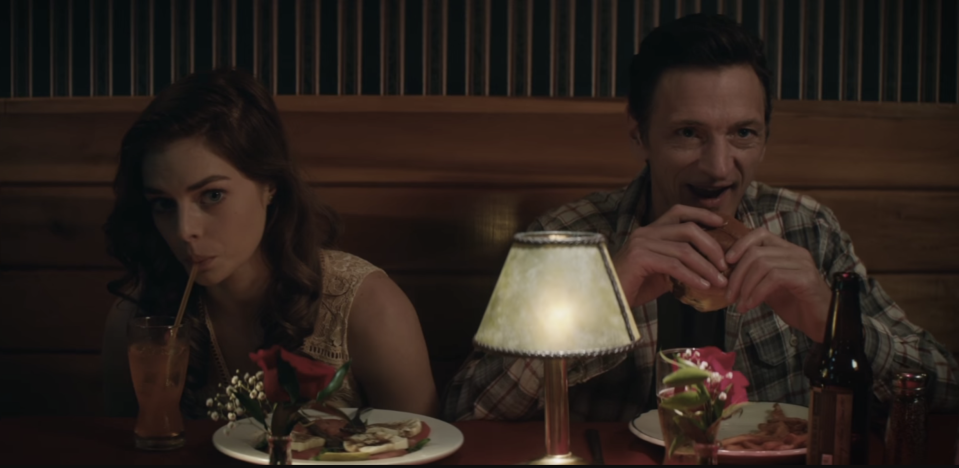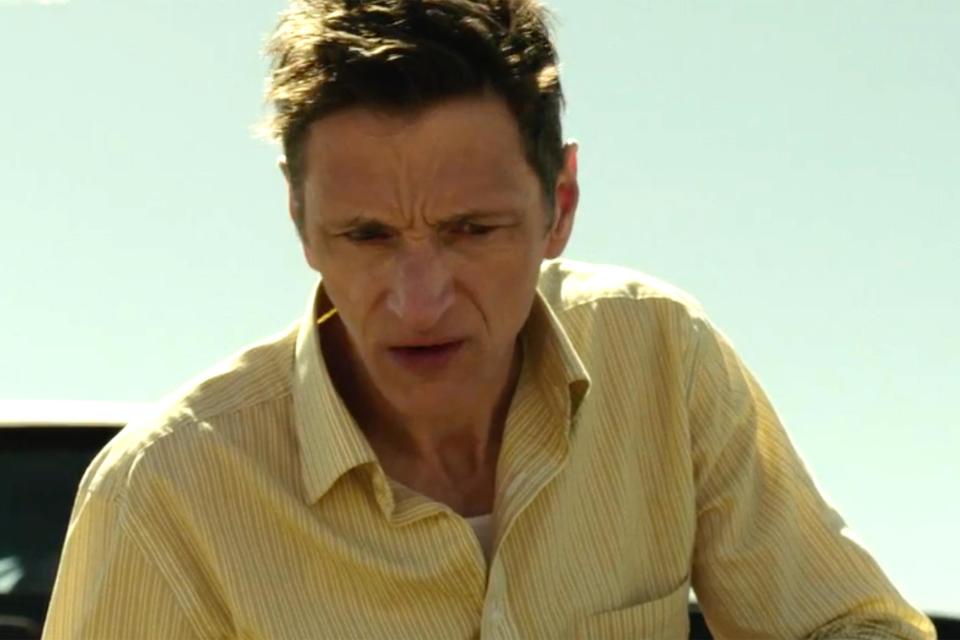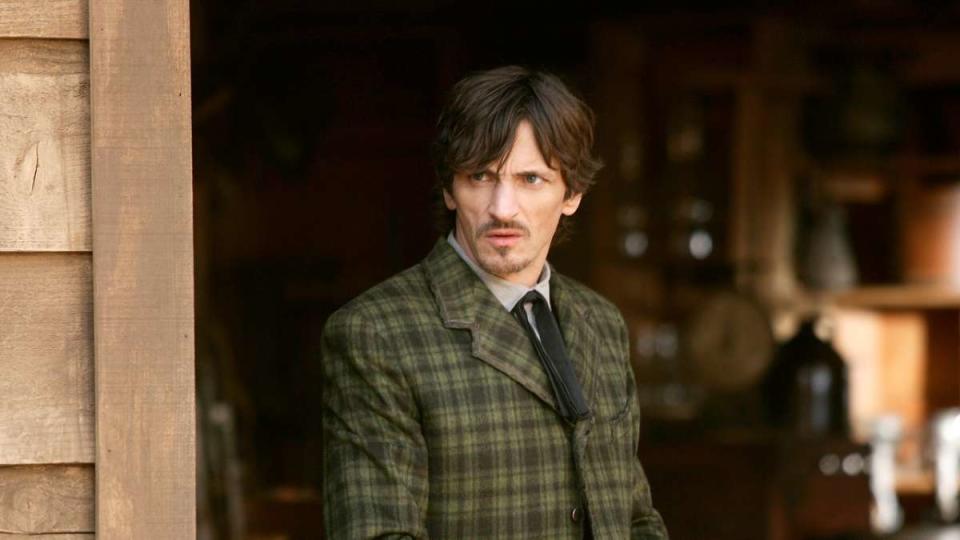John Hawkes on 'Three Billboards,' his boozy new neo-noir 'Small Town Crime,' and the long-rumored 'Deadwood' reunion

Like all great character actors, John Hawkes isn’t necessarily known by name, but everyone recognizes his face. That’s because, over the course of the past two decades, he has established himself as one of cinema’s most versatile talents. Equally comfortable in dramas and comedies, Hawkes is best known for his small-screen work on HBO’s Deadwood and Eastbound & Down and his stellar multiplex turns in Winter’s Bone (for which he received an Oscar nomination) and The Sessions. Currently, he can be seen as the ex-husband of Frances McDormand’s furious mother in the Golden Globe-winning Three Billboards Outside Ebbing, Missouri, where in just a few scenes he makes an indelible impression. And on Friday, he gets to command the spotlight as a beer-loving former cop looking to solve a murder — and, in the process, right his life’s wayward course and get back on the force — in the sharp neo-noir Small Town Crime, co-starring Octavia Spencer, Anthony Anderson, and Robert Forster. On the occasion of that film’s release, we chatted with the thoughtful Hawkes about his varied TV and movie careers, award shows, playing boozy characters, and the prospects of that long-rumored Deadwood reunion.
Yahoo Entertainment: Were you excited by Three Billboards’ Golden Globes wins? And do you watch award shows, generally?
John Hawkes: I don’t want to seem ungrateful or anything, but I don’t really watch a lot of award shows. A few times I’ve been invited to attend by a nomination, and I went. But I’ve never really watched them. I’m not disinterested; I usually just forget that they’re on [laughs] and I’m watching something else. But I was really proud of the whole bunch there — Martin [McDonagh] and Frances [McDormand] and Sam [Rockwell] and Woody [Harrelson] and on and on. It was a great night for the film, that’s for sure.
I had probably two to three days shooting on it; I wasn’t there long. But it was thrilling to work with such great people. Frances is a favorite of mine for so long. And Sam’s an old friend, and I feel like everything he does is amazing. In this film in particular, he really hit it out of the park. As did everybody.

The really wonderful thing about the awards thing is that it leads more people to the movie. And that’s kind of the point. Award shows are terrific for that — to raise awareness for movies that might not be getting it otherwise.
How does a role like this come about, where you’re almost sort of dropping in?
I’ve done that off and on for my whole career. Here in Los Angeles, and actually back in Austin, Texas, when Hollywood would shoot movies there — you know, I’d get cast as a local, and I’d have a couple of lines, and work a day or two. So that was the norm early on. And I still do it from time to time, for example for the chance to work with Martin and Frances in this case.
How did you become involved with Small Town Crime?
It was Octavia Spencer. She and I have known each other over the years, through events, auditions, and being in the same film several times but not having any scenes together. So we’ve formed a friendship of sorts over the years. She contacted me and said she had this really wonderful script and that she was going to be in it in a smaller role, while producing it. And she wanted me to be in it. She said, “I don’t want to tell you much about it,” and I said, “That’s great, because I don’t like to know really anything before I read a script.” And she said, “Can I tell you one thing? We play brother and sister.” And I thought wow, that sounds great.

It was a terrific read that didn’t betray itself. The last page was as good as the first, which is always a relief when you’re reading something. You’re cheering for it to stay great, and this one was really just a beautiful piece. Plus, it was a chance to work with Octavia, and the Nelms brothers [the directors] turned out to be really wonderful collaborators.
Are you a fan of crime fiction, or did this particular project just speak to you?
I don’t pay too much attention to the genre of something, generally, because I would be in a movie that is in a genre that might not interest me. If it’s the Citizen Kane of that genre, I’m in. Any genre, any story, can connect to an audience if it’s done in a truthful way. So I just look for a really great story in any genre, and a great character in that story, if I can find one, and then really great people who are going to tell that story.
Sometimes it’s a leap of faith. I didn’t really know the Nelms brothers’ work, but I was really impressed with them, in meeting them. It’s also great when you work with two directors, which I’ve done a number of times. These guys spent so much time crafting the story over the years that you could ask the same question to either of them at the same moment, separately, and you’d get the same answer. It’s helpful when that happens.
Aside from memorizing more lines, do you prepare for a lead role differently than for a supporting one?
Yes, there is a different process, all kind of leading to the same intended results. They’re all characters, whether it’s a really big part or a really small part, in my book. Particularly for my physical form, I don’t play a lot of really good-looking guys, or the hero, who stands there and looks great. That’s hard to do, but I don’t do that well. So for me, I always end up playing characters. The difficulty in playing a really small role, like in Three Billboards, is that, when you’re the lead, and you’re on every page, the audience knows you. They know all about you. They know what they need to know about you to hopefully relate and connect to you. Whereas when you play a really small part, you have to invent a lot of things, I think, to make the character seem believable. They have to show up onscreen as a fully formed human being, because there’s not going to be a lot of time for audiences to get to know them. So I guess that’s the difference.
There’s a boozy energy to Small Town Crime, in part because your character is always drinking. Is it a challenge (albeit a fun one) to play a part where you’re so often half-sloshed?
He drinks a lot of beer, yes [laughs]. I think we made the choice that Mike just holds his liquor well — and he’s normally a beer guy most of the time. There was one moment when he buys a bottle right before the big gunfight, but the directors decided that should be out of the film. They decided he shouldn’t be so drunk, so when he’s asked, “Are you drunk?” Mike replies, “I’m comfortable.” We played that a number of ways. There aren’t a lot of scenes in the film where Mike’s really drunk. There’s the moment when he’s thrown out of the club and he’s stumbling around a little bit, but he recovers there — and the problem with him getting thrown out was probably less about him being drunk than about him being belligerent with someone. Small-town stuff. We made the choice that he’d be a guy who can handle his business.

I assume it was water in those beer cans.
Yes, water or fake beer. If it was a can, it was probably water, and if it was a bottle, it was probably something that looks more like beer. It was never any real alcohol.
I assume that would get in the way of delivering a real performance.
It would, it would. I’ve never acted in an altered state. Certainly, I enjoy my off time [laughs], but I’ve never crossed that line.
That’s probably a little too Method-y…
I do have to say, there’s been a time or two, particularly early in my career, when I’m working with a movie star, and we’re shooting a scene in a bar, and there’s going to be another 15 minutes of shooting, and we’re going to do one last take in a really wide shot or something, and they might say, “Hey, I’m going to have a real beer. Do you want one?” And I’d say, “Sure.” But, yeah, I’ve never really leaned on that by any means. I can count on one hand in 35 years of acting the times I’ve had a beer.
Mike’s muscle car also brings a lot to the film, and our sense of his character. Did you get to tear up the road at all while shooting?
I did. Don Shanks is a really wonderful stunt driver, and he kept saying, “You can do this.” I don’t have any real training; he showed me a thing or two. But a lot of the time, even when you can’t tell that it’s me driving, I’m happy to report that it is me driving that beast.
I’m not a car guy, a muscle-car guy. But something about that car was thrilling, because the car has its own idiosyncracies when it comes to handling and stopping and turning. It was always thrilling to get behind the wheel of that car. You sort of become the character in that instance, and Mike was a better driver than I was, and he just took over and drove, I guess [laughs].
It seemed like the kind of car that drives you as much as the other way around.
You tap on that gas pedal a little too hard, and it’ll wake you up, that’s for sure.
How does a relatively small film like this get so many established actors to participate? Was it Octavia who pulled it all together?
I think so. I think it’s her name, and then you have Anthony, and then people start to come aboard. I was really fortunate to be able to get a couple of ringers into the cast. Robert Forster and Don Harvey were both suggestions of mine that ended up working out, and that was terrific. It’s always fun to work with people a second and third time, and people you admire as people and as artists. It’s exciting.
It often seems like there’s less room in the marketplace for middle-ground movies like this, which sit somewhere between superhero blockbusters and low-budget indies. In that environment, how do films like Small Town Crime survive?
I wonder. This one I think is going to do OK, and the great thing about it is that it’ll get Eshom and Ian Nelms another shot at making a movie. I think this is their fourth movie, and they’ve been pretty small before. But a movie like this feels too small for studio viewers and too big for indie viewers. It’s in the middle. It’s not big-budget enough to be a studio film, and I guess it’s not hip or indie enough to be considered in the indie field. You’re right. I don’t know. There’s so much product, so many stories, so many choices for people. You wonder how it all gets seen and noticed. But I’m talking to you, so that’s a good sign. [Laughs]
Are there fewer opportunities in that middle-tier these days?
I’m not sure. It’s no secret that television has really covered a lot of ground in a great way. I feel like small-budget, and tiny-budget, things are turned into TV series, and they get a little more money. But that’s great. I feel like TV is sweeping up a lot of our really great writers and directors, and that’s fantastic. I think film will survive — well, I hope so. It’s all telling a story, obviously. It’s all the same idea of trying to connect to an audience. So I guess however that works is good. Although I hope we don’t wind up watching things on wristwatches eventually, because I think we’ll lose a lot of subtlety in performance that way. But we’ll see.
You’ve segued a lot between movies and TV, and in fact two of your most well-known TV series — Deadwood and Eastbound & Down — are two of my all-time favorites.
Oh, that’s great. You’ve got some range there. [Laughs]
Eastbound & Down is just fantastic.
I loved it too. I think it appealed across the board, but I do feel like for men of a certain age, it was particularly identifiable. We’ve all known a Kenny Powers, if not on that level. Someone who’s really out of their league but doesn’t know it — that’s really enjoyable to watch.
Are you more comfortable in one of those media, or is it ultimately, as you said, all about stories?
Each set has its own personality, and I don’t know if TV or film sets have a particular personality. They might, but it eludes me. Mostly, it’s about working with people and trying to tell the truth, and that’s going to be the same even if you’re onstage. I mean, you’ll approach it differently in a live theater situation, but it’s always going to be the same thing of trying to find the truth in a story and trying to connect with your audience.
You did the Amazon pilot for The Legend of Master Legend, which is about a real-life superhero. Have you ever been interested in doing a big Marvel-style movie?
I don’t know. I’ve kind of avoided it to this point. I’ve had an opportunity or two, in television and film, to go more that route, and I’m not against it at face value. But it’s got to fit. It’s got to be something I feel I can bring something to. I’m not totally against that; I’m certainly in some bigger movies. But I guess I haven’t done a ton of popcorn movies in a while. You could say Everest is a film sort of like that — a big film, even if it was shot like a big independent film overseas. But it was a larger budget and some real name actors.
I don’t have much of a system. And also, I enjoy off time. So I need to factor that in as well.
Is there any hope for the Deadwood reunion, which people have discussed for years, and which has recently sounded like it might become a reality?
We’ve seen the smoke signals, and there have been rumblings of the same. I hope so. I’m ready. It was one of the best jobs I’ve ever had, and such a beautiful piece of storytelling that Mr. [David] Milch and all the collaborators made. I would jump at the chance. I hope it happens. I’m cautiously optimistic, I would say.

It’s amazing how many, myself included, are still clamoring for it, after all these years.
It’s true. I love the idea. And I love the idea that shows like Roseanne and The X-Files have come back for another round. I think that’s interesting; these are worthy shows that have an audience still, and I like the fact that they’re giving it another go.
And in the meantime, you’re also working on Nicolas Winding Refn’s upcoming Amazon series, Too Old to Die Young.
Yeah, I’m keen to start work on it — it’s what they call a closed-end, limited-run, one-season 10-episode series. Nicolas Winding Refn is doing all the episodes, and it’s Miles Teller, Jenna Malone, and I’m lucky to be in it. That’s why I’m going to ride a horse right now, because I ride a horse a little bit in the show [laughs]. That starts in a week for me, and I’m really looking forward to it. The writing is really beautiful. I think it’ll be great.
Small Town Crime is in theaters. Watch the trailer:
Read more from Yahoo Entertainment:

 Yahoo Movies
Yahoo Movies 
